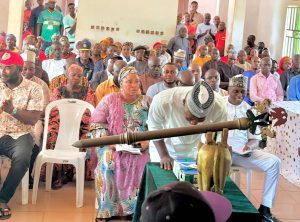Interrogating The Pros and Cons of The Nigeria Cashless Economy and Policy: The Untold History

By: Abdulkadir Bin ABDULMALIK
Political and Season Analyst,
Abdulmalikabdulkadir@gmail.com
0813641875/ 07055326441
PRPU, Kogi State Polytechnic Lokoja
INTRODUCTION
To start with, according to PRASANNA, an Indian Author and Editor-in-Chief with Aplus Topper, a cashless economy is an economic system where digital transactions such as net/ mobile banking, digital wallets, and paying by debit or credit cards substitute the traditional payment method made through cash. A cashless policy is an economic policy aimed at reducing the amount of produced currency in the economy; it involves more electronic-based payments.
In simple term, a cashless policy refers to any policy that aims to discourage the use of huge raw cash or hard notes for transactions but encourages the use of bank transfers, ATM cards, POS, and other financial instruments for transferring cash in transactions.
However, there are essential examples around the world illustrating how cashless payments are economic propellers. In western or developed Nations, Cash is no longer king. Conversely, vast research shows that economies that switch to digital are more successful; the switch can boost annual GDP by as much as 3 percentage points.
BACKGROUND TO THE STUDY
In 2012 When Sheikh. Sanusi Lamido Sanusi, the then Central Bank Governor launched the cashless policy — it was received with different opinions by the citizens. The cashless policy began in Lagos in January 2012, while the policy took effect in some other states like Rivers,, Anambra, Abia, Kano, Ogun, and the Federal Capital on the 1st of July 2013. The policy was implemented nationwide in July 2014.
The implications of the policy on the economy can be evaluated based on different perspectives. It depends on the government’s objectives, results, and researcher’s objectives. The government’s objectives are not certain but we’ve no option but to evaluate the policy based on the government’s objectives. Nevertheless, refereeing the policy based on the government’s objectives is also wrong and can lead to an erroneous conclusion. It’s a grievous mistake people make to judge policy based on government objectives, not the results.
As Milton Friedman wrote, “Governments never learn; only people learn.” Milton Friedman. He argued One of the great mistakes is to judge policies and programs by their intentions rather than their results.” – Interview with Richard Heffner on The Open Mind (Dec. 7, 1975).
PROS AND CONS OF THE NIGERIA CASHLESS ECONOMY AND POLICY: THE UNTOLD HISTORY.
As establish in the background of the study, the cashless policy was first launch in 2014 and its prescription in economics is not free of errors like in medicine and other related fields. So we can judge the policy based on its objectives and assume all other variables are kept constant. The cashless policy is a complement to the Naira Redesigned strategy; they are just twin brothers though with four legs but two hands and one head.
The cashless policy will benefit the poorer masses (proletariat) more than the ruling class (Bourgeoisie) as Nigeria is projected by the United Nations to be the third most populous nation in the world taking over from the USA by 2050 and if cashless policy is well managed and implemented is capable of fighting inflation to a standstill.
PROS OF THE CASHLESS POLICY
- REDUCTION IN THE PRINTING COST OF PHYSICAL CURRENCY
According to the USA Board of Governors of the Federal Reserve System, each year, the Federal Reserve Board projects the likely demand for the new currency and places an order with the Department of the Treasury’s Bureau of Engraving and Printing, which produces U.S. currency and charges the Board for the cost of production. The 2022 currency operating budget is $1,060.0 million. Just like in the US, every naira note produced attracted a cost. Before now, just like crude oil that we export before importing the PMS back with a severe trade imbalance on our current account, we were equally told that naira is being produced outside the country with a serious cost. The Nigerian Security Printing and Minting Limited will henceforth print naira as they did for the newly redesigned naira notes which will make the country one out of the four African countries that print their currencies locally and not import from foreign countries, and this is a plus to Nigeria. Although, the real point here is that, if the cashless policy is effectively implemented physical notes will be printed which means less expenditure on the cost of printing currency in Nigeria.
- LESS HOARDING AND FORGED CURRENCY.
An unconfirmed report has it that Nigerians had returned over 1 trillion naira since the inception of the naira redesigning policy. A lot of people who are afraid of returning money to banks on their own are using the same to buy properties, farmland, and other investments, all of these actions directly or indirectly lubricating the economy through effective liquidity circulation. And since you can no longer hoard currency the forged currency values will be declared worthless. People involved in socially evil practices generally involve in social evil practices tend to accumulate their wealth in cash. With the process of a cashless economy coming into effect, this accumulated cash will be useless due to the note ban. If people invest money in the bank, the government will question them about that particular income source.
- A DRIVER TO MITIGATE CORRUPTION AND ENSURE A TRANSPARENT SYSTEM
Theft or fraudulent acts like kidnapping and banditry concerning cash will be reduced to its bearest minimum. Following the note ban, nobody would dare to steal money, which will promptly hinder the theft since the banks won’t accept that money anywhere. As opined by the World Economic Forum, cashless technologies could be a game changer and some of the greatest assets in the fight against corruption and organized crime too. If everyone were connected to an end-to-end payment infrastructure-a cashless environment-there would be transparency in money flows. Whether it’s international aid or private investment, if everyone in the chain were connected digitally, you could see where the money went and how it was spent. Any sums appearing outside of that framework could immediately be flagged and investigated. This would narrow the focus for law enforcement and forensic accountants, making it easier to target and recoup hidden money.
CONS OF THE CASHLESS POLICY
The CONS of the Cashless policy will ensure Low Literacy Rate, Chances of Economic disparity, Cybercrime, overspending, identification fraud, and others but all of these can be handled or brought to the barest minimum by a strong political will, uncompromised institutional framework, proper Fintech system that is being managed and monitored by relevant regulatory and anti-grafts agencies in the country.
- The consequence will be the financial disparities and imbalance in opportunities especially in rural areas
- No alternative source of money in the case of technical issues or hacker activity.
- Technological illiteracy amongst rural dwellers.
- Limitations on amount of transactions.
However, Politics means everything, and its influence spread all over the world. The government may play politics with the policy. Such uncertainties and policy implications of government policy are the reason why the policy can’t be evaluated with only one particular theory or perspective.
CONCLUSION
A cashless economy will translate to a digital economy which means Financial Technology (FINTECH) will play a vital role in financial and economic development. The illegal non-payment or under-payment of taxes, usually by deliberately making a false declaration or no declaration to tax authorities – such as by declaring less income, profits, or gains than the amounts earned, or by overstating deductions will be reduced drastically because every payment made in the system through any Fintech platform will be easily tracked and trace. More people will be employed at superstores and other pay points because there will be multiple points of sale (P.O.S.) even in our local farmers markets. Other benefits include; Limited Cash Fraud, Effortless Payment, and Easy International Payment.
RECOMMENDATIONS
Insofar No policy work in isolation there must be a policy to support future policies.
- The government should provide Networks and other ICT facilities in rural areas for financial transactions.
- Nigeria should not just follow the rest of the developed and industrialized economies of the world but match toe-to-toe with China and India’s footsteps towards a cashless economy. Therefore, a cashless economic Policy should be embraced by all if we expect any clear and meaningful departure from the past.
- Point of sale (POS) machine should be made available to all market traders for free or otherwise. That point, the issues of “No cash” as used by individual would not surfaces.








